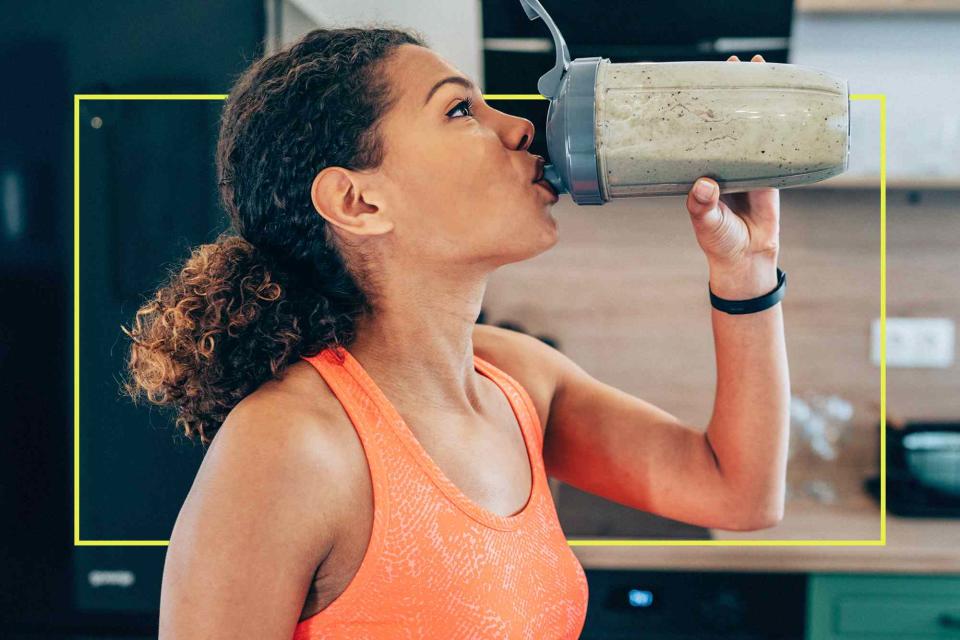How Long Does a Pre-Workout Last?
Find out how long it takes for pre-workout to kick in, and when you can expect the supplements' effects to wear off.

By now you've probably heard of pre-workout supplements, even if you prefer to roll up to your sweat sessions with no dietary prep work. The fitness supplements are available in powder, ready-made drink, or gummy form, and are designed to give your body a boost that'll allow you to make the most of your workout.
"It takes energy to perform workouts, plain and simple," says Scott Keatley, R.D., co-owner of Keatley Medical Nutrition Therapy. While the ingredients in pre-workouts vary from brand to brand, the supplements often include creatine (which increases energy and strength), caffeine (for energy), beta-alanine (which lowers the risk of muscle fatigue), and/or citrulline (which can increase oxygen uptake in your muscles and help you perform better), says Keri Gans, R.D., author of The Small Change Diet. L-arginine, which may help increase blood flow, is another popular ingredient, says Keatley. Plus, pre-workouts will usually feature additions such as flavoring, artificial sweeteners, and coloring to give you a visually appealing and tasty final product, says Albert Matheny, R.D., C.S.C.S., co-founder of SoHo Strength Lab.
Okay, but there are some big questions in all of this: How long does pre-workout last? And will you need to supplement multiple times if you're doing a long workout? Here's the deal, according to nutritionists.
How long does a pre-workout last?
Not all pre-workouts are created equal, and certain ingredients will help you power through for different periods of time, explains Matheny. "It really depends on the ingredients and the length of the workout, but on average, the effects of a pre-workout last between 30 minutes to 2.5 hours," from the time it kicks in, says Gans.
The goal is to time your consumption of the supplement so that its effects will reach their peak during your workout. "You need time for everything to be absorbed and for it to find its way to your bloodstream," says Keatley. "Giving yourself about an hour to an hour and a half prior to your workout would be ideal."
Caffeine is "usually the longest lasting and most generally used ingredient in pre-workout that make people feel a difference" in their workouts, says Matheny. There's some variation based on how quickly your body metabolizes caffeine, but you'll "start to feel some effects" about 20 minutes after you've had caffeine and that boost can continue for up to two hours, says Matheny. Caffeine stimulates your nervous system, which can make you feel more alert and energized during a workout, as Shape previously reported. "It's one of the most well-studied ergogenic — meaning performance-enhancing — aids that's available and legal on the market and within sports," Abby Chan, M.S., R.D.N., a registered dietitian nutritionist and the co-owner of EVOLVE Flagstaff in Arizona, previously told Shape.
Again, how quickly you metabolize caffeine is really person-dependent, says Matheny. In general, it's best to err on the safe side and avoid taking a pre-workout a few hours before bed, since some caffeine could linger in your system up to five hours after you take the supplement, says Keatley.
:
As mentioned, l-arginine is another ingredient that's often included in pre-workout supplements, and it seems to kick in for most people about 60 to 90 minutes after they take it, says Matheny. The half-life of L-arginine (i.e. when its effectiveness start to fall off) is between 30 and 120 minutes from when it kicks in, depending on how much you take and your individual response to it.
As for the difference between l-arginine and caffeine, that's "kind of like comparing apples to oranges," says Matheny. L-arginine is thought to increase blood flow and give muscles a "pump" while caffeine is a stimulant that boosts energy, he says. "The unproven idea is that if you're doing strength work, then l-arginine will improve your workout, and caffeine will do the same for more cardiovascular exercise," says Keatley.
How much pre-workout should you take?
With powder pre-workout supplements, brands typically recommend dissolving about 10 grams (which you can usually measure with an included scoop) in about six to 10 ounces water. With energy gels and ready-made drinks, you can skip that mixing step.
If you have an extra long workout planned, it's okay to take a second pre-workout during the session, says Matheny. You should strive to take your second pre-workout for a longer exercise session toward the beginning or middle of your workout to try to get a boost later on, he says. Sipping on a pre-workout during your long workout would be okay, says Matheny.
Pre-workout newbie? Start slow, since pre-workouts have the potential to upset your stomach and/or make you feel jittery, recommends Matheny. "I always say start with a half serving," he says. So, if the pre-workout calls for a serving that's a full scoop of powder, start with a half scoop. If you feel good with that, you can stay with that level of pre-workout. But, if you think you could use more of a boost, you can start ramping up your serving until you get to a full dose.
Overall, you'll likely need to experiment a bit with pre-workout supplements to find what works for you (and what tastes best). "It really can come down to trial and error, and finding a brand that is well-tolerated by your stomach and helps to achieve the extra oomph you are looking for," says Gans.

